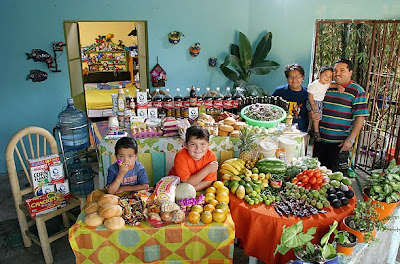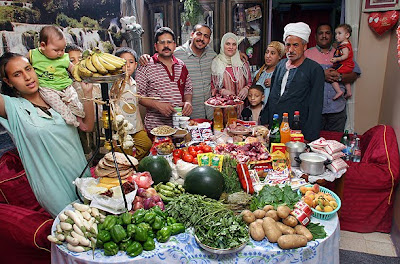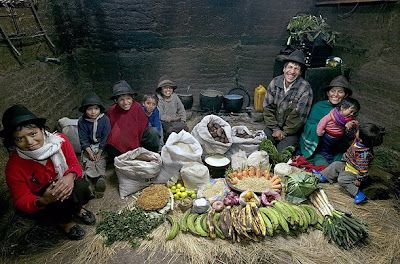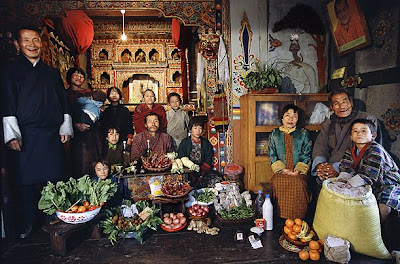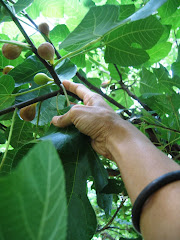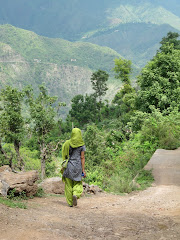 W
While the governments of the world move at a snail’s pace in solving the energy crisis, a grass roots conscious movement at the consumer level can turn the tide around. It is just a matter of realization, consciousness, and making some lifestyle changes. And it is starting to happen around the world. It is significant and it is the only thing we can do right now – And it is very simple -
Reduce the demand on Energy.Unfortunately, It pains me to see how the well off Sikh community (and South Asian community in general) in both the East and the West is so complacent to one of the biggest crisis in the world right now. We have not shown any concern (lest it affects our pockets) much less leadership and vision in this area. Addicted to cheap stuff made in China, driving the biggest gas guzzlers, buying huge houses that ultimately end up owning us (instead of us owning them), and loitering the landfills with disposables we show our affluence everywhere; we trash the environment and take a lot of pride in it.
I hate to start this article by blasting my community and am getting off the point here but I am little turned off now and I think you may appreciate where I am coming from, if you let me share my heart.
I had an opportunity to drive a few teens for 5 hours from a Gurmat Camp to a field trip venue and back, lately. I, being the tree hugger and all, wanted to take the time to turn that long drive into a useful discussion on the global energy and environmental crisis. I am ashamed to say that I was totally unsuccessful.
With all due respect to their good character and behavior otherwise, they were absolutely not interested in such an important issue that is affecting us all; and mind you I was not lecturing. (And I believe it is one hundred percent their parent’s fault, not their own). I was interested in  listening and creating a dialogue, but all they had to offer was their enthusiasm about the 12 cylinder Ferrari their relative bought, or the10 bedroom beach- front house their friend owns complete with pool and tennis. When I brought up the point that global warming is not so far out, and that it is affecting our lives everyday, one of them mentioned that her family had a large mansion in India they can go to, if something like the wildfires got to them.
listening and creating a dialogue, but all they had to offer was their enthusiasm about the 12 cylinder Ferrari their relative bought, or the10 bedroom beach- front house their friend owns complete with pool and tennis. When I brought up the point that global warming is not so far out, and that it is affecting our lives everyday, one of them mentioned that her family had a large mansion in India they can go to, if something like the wildfires got to them.
Even though my ears started hurting from all the materialistic chatter, I didn’t give up. As a last resort on the way back, I told them that they could only speak in the car if they talked about Sikhi values, benevolence or taking care of mother Earth. There was a silence for the next 10 minutes, and then one of them broke it, “ there are these organic jeans at the Gap for a hundred and eighty dollars that are so cool…..”.
Now that you understand where I am coming from, let us get to the point.
So, my message for today is that common sense change at the grass roots level can reverse the energy crisis, and the environmental crisis. And I expect my community not only to be a part of that change but the leader of that change.
Why ? Because we have the tradition. Our faith is a green faith. Earth is designated as our physical Mother in Gurbani and we have the obligation to take care of it. We have the duty to leave a better world for our next generations.
Take the example of our great environmentalists like late Bhagat Puran Singh Ji who spent all his life lobbying and caring for two causes (not one as we know him mostly for). Yes, along with caring for the crippled, his biggest passion was saving the environment.
I first came across his marvelous writings on saving our trees and rivers, and the concerns over desertification of Punjab, couple of decades ago when I was a young girl visiting Punjab. His volunteers handed me a pamphlet on recycled paper that talked about it all, as we walked out of Darbar Sahib. While most of the pamphlets were used by people to wrap over left over Parshad, or to wipe hands, I saved it and asked my Dad to read and translate it for me. (I could not read Punjabi back then). I still remember all the words my Dad uttered. The rivers are being poisoned, the land is becoming a desert, we need to live simply, and we need to plant trees if we are to save our future….
Guru Sahib too stresses living simply and using less over and over in Gurbani. It can be applied everywhere in our lives.
Coming back to energy crisis and what we can do to reverse it, I couldn’t stress enough - Reducing the demand on energy at the consumer level is t he first way to solve this crisis.
I am citing some useful tips that we have easily incorporated in our lives and have successfully made a contribution from our little household. The point is not to boast but to share, empower, and inspire my friends and community to join in. So, please forgive the repeated usages of ‘We’ and ‘I’. Take what you can and think of your own creative ways that work for You.
Be the beacon of change by making some common sense changes in your lives and educating your children and the communities about it.

We have taped shut our clothes dryer since the Earth Day of this year. With so much solar heat outside, the line drying of clothes is working just fine and we have reduced our energy bill by over 10%. It also gives us an opportunity to breathe some fresh air and smell the roses and jasmine, while we fold our laundry in the back yard. It's one of the simplest ways one can use alternative energy directly and think beyond fossil fuels.
By planting trees around the house and getting green shrubbery close to the windows, over the years we have developed a mature shade-giving canopy around the house. The temperature underneath the shade is 10-15 degrees cooler than the ambience. We rarely need to use the air conditioner. We open the windows in the night when the temperatures are low and let the house cool. In the late morning we shut windows, pull the shades, and enjoy the moderately cool house. Energy savings – 20% .
We drive less. We try to car pool everywhere we go with my child’s activities. I have managed telecommuting from home for a few days out of the month and re-pay my employer by working for an extra hour those days. With the saving in my driving time that is an easy thing to do. By making simple changes in driving habits such as reduced consistent speed and accelerations, keeping tires inflated, and keeping clean air filters 10% to 30% of fuel consumption can be saved. The national gas bills may have gone up but ours have gone down by over 10%.
We have literally stopped visiting shopping malls. We go to the mall only if we absolutely need an item and can’t find it online. It used to be that I would go to malls and buy things I absolutely didn’t need instead of the one I set out for. We still dress up very nicely and have saved thousands – YES, thousands of dollars in the last three years from spurious shopping. That takes care of my dasvandh (tithe) right there and gives us a chance to invest that money on community projects and more greening.
We try to buy locally manufactured goods even if we have to pay a few bucks extra. There are hidden costs of shipping involved with buying cheap stuff made in China (I am not picking on China, just making the point). Shipping of cheap imported goods pollutes environment, kills wildlife, and is bad for the local economies. Here the savings don’t show up in our account but they help the world energy supplies and local economy and we take a great pride in that.
Weddings, Birthdays, Graduations? We give one of the three things: 1) spiritual/educational/local handicraft items 2) trees or 3) cash. It saves on a lot of headaches, time and driving around and enriches the lives of the people we love while helping the environment.
With all the conservation mania, one would wonder if we ever have any fun in our lives ? You bet we do. We are the biggest eco travelers you’ll come across. We hike, kayak, swim and snorkel. We take a lot of vacations at close by destinations and most of them are camping trips. We have camped for over 10 years in the most pristine and beautiful state and national parks in the U.S. but never once have we run into another Sikh family having eco fun. (They probably were busy going to shopping destinations around the world for vacations). One saves over 75% on the carbon emissions by driving (vs. flying), visiting local destinations and camping vs. using environmentally unfriendly hotels/resorts.
You probably have read about all the simple changes we have made in our kitchen. If not you must read them here. My neighbor was shocked the other day when we compared our energy bills. We consume less than 50% of the energy and water they do. We have the same size houses and yes we shower every day. With all the savings in energy costs we can afford to eat healthier, local and organic foods.
We made all these changes gradually, so they were not as hard to make as one might think. Over time they have become our lifestyle. We keep looking for new ways to contribute to the reversal of global warming. The most important thing is awareness and the feeling of responsibility.
Also, what helps is that we are not ashamed to be called conservationists. We are proud of it. Carrying our green smoothies or water in reusable glass jars, toting our cloth shopping bags is a statement we love to make. Reducing, Reusing and Recycling is the mantra we are more than happy to share with our colleagues, neighbors, families and friends. Sometimes we get called “poor” or “cheap” in the affluent circles, and we just smile.
How else will this become a grass roots movement if we were not to pour out our passion, overcome false pride, tame the mind and educate and inspire the world with all we have?
And now, I hope, each of you is inspired to contribute to the reversal of this crisis by making a change, one simple change in your lifestyle.
Like Margret Mead has said:
"Never doubt that a small group of thoughtful, committed citizens can change the world. Indeed, it's the only thing that ever has."
*******
I may not agree with our President on many issues, but I do comply with his policy of
Voluntary Emission Control













